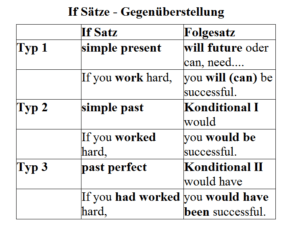exercises and solutions if-clauses type 1
Quiz-summary
- 1
- 2
- 3
Information
if-clauses type 1 exercises and solutions
Results
Categories
- Not categorized 0%
- 1
- 2
- 3
- Answered
- Review
-
Question 1 of 3 1.
Question Match the elements to form meaningful sentences:
Sort elements
- you will be succesful.
- he needn't worry about debt collectors.
- we will be sick.
- you will get a good exam.
- we won't get a sunburn.
-
If you work hard,
-
If he pays his bills,
-
If we drink too much lemonade,
-
If you study much,
-
If we got to England
-
Question 2 of 3 2.
Question Fill the verb respectively the auxiliary into the blanks.
Use the will-future like in the example:If it rains,_________at home.(stay) – If it rains, we will stay at home.
- If you do too much sport, you ('ll be, will be) tired. (be) If you drink this, you ('ll feel, will feel) better. (feel) If this happens again, you ('ll drop out, will drop out) of school. (drop out) If you don't like it, I ('ll order, will order) another dish. (order) It (won't be, will not be) a problem if you ask nicely. (not be) If the phone rings my son (will answer) it. (answer)
Hint
Der If Satz erster Ordnung gibt im if-Satz eine Bedingung vor,
die im Folgesatz eine zwingende Konsequenz darstellt:
Wenn A, dann B.
Der If-Satz steht im simple present, der Folgesatz im will-future,
oder benutzt ein anderes modales Hilfverb im Indikativ.
(can, must, need, mustn’t…)example:
If you work hard, you will be successful
-
Question 3 of 3 3.
Question Fill the verb respectively the auxiliary into the blanks.
Use the will-future like in the example:
.If work hard,_________exam. (pass) – If you work hard, you will pass the exam.
- If you go to bed now, you (will feel) better tomorrow. (feel) If you want to, I (will do) the dishes for you. (do) If we don't work harder, we (will not be finished, won't be finished) on time. (not be finished) If you drink too much alcohol, you (will get) stupid. (get) If you don't tell him, I (will do) it. (do) If you speak in Chinese, people (will not understand, won't understand) you. (not understand)
Hint
Der If Satz erster Ordnung gibt im if-Satz eine Bedingung vor,
die im Folgesatz eine zwingende Konsequenz darstellt:
Wenn A, dann B.
Der If-Satz steht im simple present, der Folgesatz im will-future,
oder benutzt ein anderes modales Hilfverb im Indikativ.
(can, must, need, mustn’t…)example:
If you work hard, you will be successful



